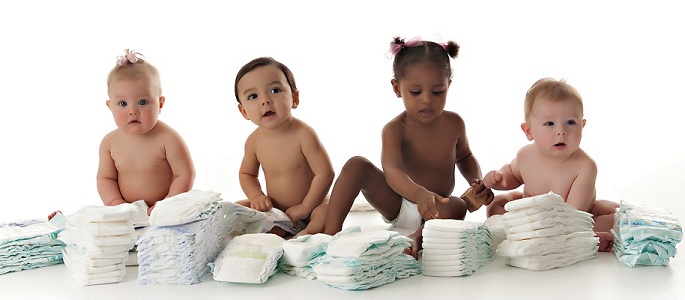Breastfeeding is one of the best ways for you to take care of your newborn. New and even seasoned mothers can get frustrated, worrying about how much milk their child is getting when nursing. One of the most highly recommended methods is paying attention to the wet diapers. What's gone in will have to come out and some signs can help you know what your child is getting.

How Many Wet Diapers Should a Newborn Have?
The First Week
Babies can lose as much as 7% of their birth weight. This can be gained back at a rate of 6 ounces a week once mom gets her milk in.
Wet Diapers
Your newborn will generally have only one wet diaper on the first day, two on the next day, and three on the third day. To get an idea of what a wet diaper constitutes, place 3 or 4 tablespoons of water in a fresh diaper and this is what your baby's should feel like. Another way to check is by using a tissue to see if it's wet.
Dirty Diapers
In these initial days, you will see the same amount of dirty diapers as that of wet diapers. Stools will be yellow after the fourth day and then the baby should pass 3 or 4 quarter sized or larger stools a day. This is normal, as is a soft or runny stool that is curdy or seedy. With some babies, this will happen every time they nurse, with others it's more often.
Week 2-6
Once the newborn has gotten a routine, it can be easy to stop worrying but you still want to keep an eye on intake and output. How many wet diapers should a newborn have from week two to six? You can expect some changes here.
Wet Diapers
Newborns will start to produce from 5-6 wet diapers in a 24-hour period after they are two weeks old. When your newborn gets past 6 weeks of age, her wet diapers may drop by one or two a day but the urine will increase to around 6 tablespoons. This is because your baby's bladder capacity is growing.
Dirty Diapers
From the second week on you'll start to notice between 3 and 4 dirty diapers with a quarter-sized stool. After four and more weeks, the stools may be less frequent. Your baby may only pass a stool once every 7 days or so. You don't need to worry as long as your baby is gaining weight.
More Signs to Tell If Your Baby Is Getting Enough Milk
1. Changes of Your Breasts
In addition to knowing how many wet diapers should a newborn have, evaluating the feeding and your breasts can help.
- Breasts will generally feel full before nursing and soft after. As you continue to nurse and your baby gets older, this will be less noticeable because your breasts become more efficient at producing the right amount of milk for your child.
- It is common for mothers to see a milk ejection reflex a few moments into nursing. When you watch your baby, you will see his or her sucking gets stronger with more frequent swallowing.
- When you see your baby swallowing often, sucking enthusiastically, and falling to sleep, he or she is likely to have had plenty of milk.
- Finally, if you notice droplets of milk at the side of your babies' mouth, and hear them swallow every one or two sucks, they are getting milk.
2. Baby Weight Gain
Your pediatrician will check on your infant's weight gain every few days.
- Whether bottle-fed or breastfed, babies generally lose 5-7% of their birth weight in those initial days. This is from loss of extra fluid.
- When babies are able to nurse frequently, less weight will be lost. Babies who get a slow start here will tend to lose more weight.
- Once birth weight is regained, the average infant gains at a rate of 4-7 ounces a week. This gradually comes to about a pound a month, although again it can vary greatly.
3. Baby's Urine Color
You can tell whether your newborn is getting enough milk by checking the color of his or her urine. Water-colored or pale urine usually indicates good hydration while darker or apple-juice colored urine tells you the baby isn't getting enough. If you notice "brick dust" or urate crystal residue (because the urine is too concentrated), consult your pediatrician. You may need to supplement nursing with formula for a short time.
When to Seek Help
Knowing how many wet diapers should a newborn have is not enough. The following signs indicate that your newborn isn't getting enough milk:
- Your breasts aren't softer after nursing.
- Your nipple looks pinched or misshapen after nursing.
- Your newborn's birth weight isn't regained by two weeks old.
- Your baby is not content after feeding.
- Your baby is around five days old and you're getting fewer than five wet diapers, or they're older and you're seeing less than six in 24-hours.
- Your baby is very sleepy and you have to wake him to feed him.
- Your baby makes clicking noises or has dimples while nursing. These are signs of a poor latch.
